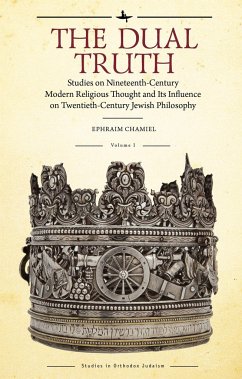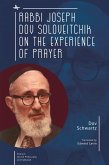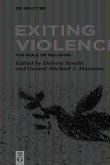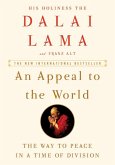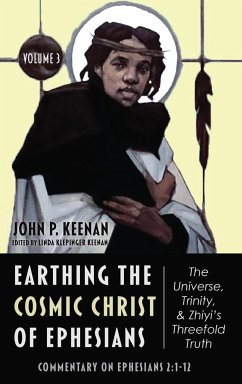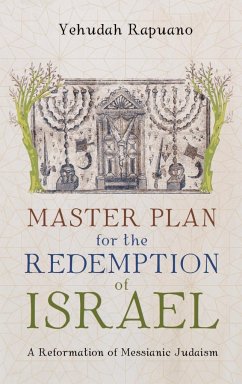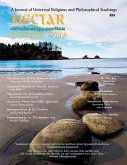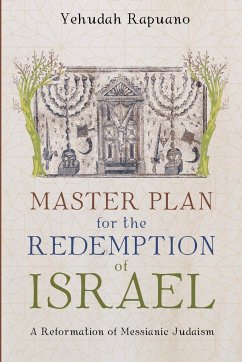Ephraim Chamiel
The Dual Truth, Volumes I & II
Studies on Nineteenth-Century Modern Religious Thought and Its Influence on Twentieth-Century Jewish Philosophy
Ephraim Chamiel
The Dual Truth, Volumes I & II
Studies on Nineteenth-Century Modern Religious Thought and Its Influence on Twentieth-Century Jewish Philosophy
- Gebundenes Buch
- Merkliste
- Auf die Merkliste
- Bewerten Bewerten
- Teilen
- Produkt teilen
- Produkterinnerung
- Produkterinnerung
This book explores three schools of fascinating, talented, and gifted scholars who absorbed into their thought the Jewish and secular cultures of their respective homelands.
Andere Kunden interessierten sich auch für
![Rabbi Joseph Dov Soloveitchik on the Experience of Prayer Rabbi Joseph Dov Soloveitchik on the Experience of Prayer]() Dov SchwartzRabbi Joseph Dov Soloveitchik on the Experience of Prayer162,99 €
Dov SchwartzRabbi Joseph Dov Soloveitchik on the Experience of Prayer162,99 €![Exiting Violence Exiting Violence]() Exiting Violence109,95 €
Exiting Violence109,95 €![An Appeal to the World An Appeal to the World]() Dalai LamaAn Appeal to the World14,99 €
Dalai LamaAn Appeal to the World14,99 €![Earthing the Cosmic Christ of Ephesians-The Universe, Trinity, and Zhiyi's Threefold Truth, Volume 3 Earthing the Cosmic Christ of Ephesians-The Universe, Trinity, and Zhiyi's Threefold Truth, Volume 3]() John P. KeenanEarthing the Cosmic Christ of Ephesians-The Universe, Trinity, and Zhiyi's Threefold Truth, Volume 344,99 €
John P. KeenanEarthing the Cosmic Christ of Ephesians-The Universe, Trinity, and Zhiyi's Threefold Truth, Volume 344,99 €![Master Plan for the Redemption of Israel Master Plan for the Redemption of Israel]() Yehudah RapuanoMaster Plan for the Redemption of Israel44,99 €
Yehudah RapuanoMaster Plan for the Redemption of Israel44,99 €![Nectar of Non-Dual Truth #34 Nectar of Non-Dual Truth #34]() Babaji Bob KindlerNectar of Non-Dual Truth #3415,99 €
Babaji Bob KindlerNectar of Non-Dual Truth #3415,99 €![Master Plan for the Redemption of Israel Master Plan for the Redemption of Israel]() Yehudah RapuanoMaster Plan for the Redemption of Israel34,99 €
Yehudah RapuanoMaster Plan for the Redemption of Israel34,99 €-
-
-
This book explores three schools of fascinating, talented, and gifted scholars who absorbed into their thought the Jewish and secular cultures of their respective homelands.
Hinweis: Dieser Artikel kann nur an eine deutsche Lieferadresse ausgeliefert werden.
Hinweis: Dieser Artikel kann nur an eine deutsche Lieferadresse ausgeliefert werden.
Produktdetails
- Produktdetails
- Verlag: Academic Studies Press
- Seitenzahl: 596
- Erscheinungstermin: 23. Januar 2019
- Englisch
- Abmessung: 234mm x 156mm x 10mm
- Gewicht: 1157g
- ISBN-13: 9781618118820
- ISBN-10: 161811882X
- Artikelnr.: 54159416
- Herstellerkennzeichnung
- Libri GmbH
- Europaallee 1
- 36244 Bad Hersfeld
- gpsr@libri.de
- Verlag: Academic Studies Press
- Seitenzahl: 596
- Erscheinungstermin: 23. Januar 2019
- Englisch
- Abmessung: 234mm x 156mm x 10mm
- Gewicht: 1157g
- ISBN-13: 9781618118820
- ISBN-10: 161811882X
- Artikelnr.: 54159416
- Herstellerkennzeichnung
- Libri GmbH
- Europaallee 1
- 36244 Bad Hersfeld
- gpsr@libri.de
Dr. Ephraim Chamiel has filled various managerial positions at Israeli Bank Leumi. Upon his early retirement, he completed his Doctorate in Jewish Thought at Hebrew University, teaching there for a number of years. He is currently continuing his research in modern Jewish thought.
Volume I Translator
s Note Foreword to the English Edition Introduction Chapter One: Samson Raphael Hirsch: The Neo-Orthodox, Neo-Romantic Educator, and his Approach of Neo-Fundamentalist Identicality Chapter Two: Interpretations of Hirsch
s Thought from the Right and the Left Chapter Three:
Heavenly Reward
Samuel David Luzzattös Doctrine of Divine Providence
between Revelation and Philosophy Chapter Four: Development of Halakhah: Luzzattös Evolving Views Chapter Five: The Peshat is One, Because the Truth is One: Luzzatto between Interpretation and Thought Chapter Six: Luzzatto and Maimonides:
Accept Truth from Whoever Speaks It
Chapter Seven: Luzzatto on Theosophical Kabbalah: Harmful Invention with Worthy Intentions Chapter Eight: Between Reason and Revelation: The Encounter between Rabbi Tsvi Hirsch Chajes and Nahman Krochmal Volume II Chapter Nine: Hirsch
s Influence on Religious Jewish Philosophy in the Twentieth Century Chapter Ten: Hirsch
s Influence on Rabbi David Tsvi Hoffmann
s Commentary on the Pentateuch Chapter Eleven: Hirsch
s Influence on Twentieth-Century Halakhic Decisors Chapter Twelve: The Influence of German Neo-Orthodoxy on the Young Rav Kook Chapter Thirteen: Luzzattös Influence on Umberto Cassutös Method of Biblical Interpretation Chapter Fourteen: Tolerance, Pluralism, and Postmodernism
A Dialectic of Opposites in Jewish Thought in the Modern Era
s Note Foreword to the English Edition Introduction Chapter One: Samson Raphael Hirsch: The Neo-Orthodox, Neo-Romantic Educator, and his Approach of Neo-Fundamentalist Identicality Chapter Two: Interpretations of Hirsch
s Thought from the Right and the Left Chapter Three:
Heavenly Reward
Samuel David Luzzattös Doctrine of Divine Providence
between Revelation and Philosophy Chapter Four: Development of Halakhah: Luzzattös Evolving Views Chapter Five: The Peshat is One, Because the Truth is One: Luzzatto between Interpretation and Thought Chapter Six: Luzzatto and Maimonides:
Accept Truth from Whoever Speaks It
Chapter Seven: Luzzatto on Theosophical Kabbalah: Harmful Invention with Worthy Intentions Chapter Eight: Between Reason and Revelation: The Encounter between Rabbi Tsvi Hirsch Chajes and Nahman Krochmal Volume II Chapter Nine: Hirsch
s Influence on Religious Jewish Philosophy in the Twentieth Century Chapter Ten: Hirsch
s Influence on Rabbi David Tsvi Hoffmann
s Commentary on the Pentateuch Chapter Eleven: Hirsch
s Influence on Twentieth-Century Halakhic Decisors Chapter Twelve: The Influence of German Neo-Orthodoxy on the Young Rav Kook Chapter Thirteen: Luzzattös Influence on Umberto Cassutös Method of Biblical Interpretation Chapter Fourteen: Tolerance, Pluralism, and Postmodernism
A Dialectic of Opposites in Jewish Thought in the Modern Era
Volume I Translator
s Note Foreword to the English Edition Introduction Chapter One: Samson Raphael Hirsch: The Neo-Orthodox, Neo-Romantic Educator, and his Approach of Neo-Fundamentalist Identicality Chapter Two: Interpretations of Hirsch
s Thought from the Right and the Left Chapter Three:
Heavenly Reward
Samuel David Luzzattös Doctrine of Divine Providence
between Revelation and Philosophy Chapter Four: Development of Halakhah: Luzzattös Evolving Views Chapter Five: The Peshat is One, Because the Truth is One: Luzzatto between Interpretation and Thought Chapter Six: Luzzatto and Maimonides:
Accept Truth from Whoever Speaks It
Chapter Seven: Luzzatto on Theosophical Kabbalah: Harmful Invention with Worthy Intentions Chapter Eight: Between Reason and Revelation: The Encounter between Rabbi Tsvi Hirsch Chajes and Nahman Krochmal Volume II Chapter Nine: Hirsch
s Influence on Religious Jewish Philosophy in the Twentieth Century Chapter Ten: Hirsch
s Influence on Rabbi David Tsvi Hoffmann
s Commentary on the Pentateuch Chapter Eleven: Hirsch
s Influence on Twentieth-Century Halakhic Decisors Chapter Twelve: The Influence of German Neo-Orthodoxy on the Young Rav Kook Chapter Thirteen: Luzzattös Influence on Umberto Cassutös Method of Biblical Interpretation Chapter Fourteen: Tolerance, Pluralism, and Postmodernism
A Dialectic of Opposites in Jewish Thought in the Modern Era
s Note Foreword to the English Edition Introduction Chapter One: Samson Raphael Hirsch: The Neo-Orthodox, Neo-Romantic Educator, and his Approach of Neo-Fundamentalist Identicality Chapter Two: Interpretations of Hirsch
s Thought from the Right and the Left Chapter Three:
Heavenly Reward
Samuel David Luzzattös Doctrine of Divine Providence
between Revelation and Philosophy Chapter Four: Development of Halakhah: Luzzattös Evolving Views Chapter Five: The Peshat is One, Because the Truth is One: Luzzatto between Interpretation and Thought Chapter Six: Luzzatto and Maimonides:
Accept Truth from Whoever Speaks It
Chapter Seven: Luzzatto on Theosophical Kabbalah: Harmful Invention with Worthy Intentions Chapter Eight: Between Reason and Revelation: The Encounter between Rabbi Tsvi Hirsch Chajes and Nahman Krochmal Volume II Chapter Nine: Hirsch
s Influence on Religious Jewish Philosophy in the Twentieth Century Chapter Ten: Hirsch
s Influence on Rabbi David Tsvi Hoffmann
s Commentary on the Pentateuch Chapter Eleven: Hirsch
s Influence on Twentieth-Century Halakhic Decisors Chapter Twelve: The Influence of German Neo-Orthodoxy on the Young Rav Kook Chapter Thirteen: Luzzattös Influence on Umberto Cassutös Method of Biblical Interpretation Chapter Fourteen: Tolerance, Pluralism, and Postmodernism
A Dialectic of Opposites in Jewish Thought in the Modern Era

